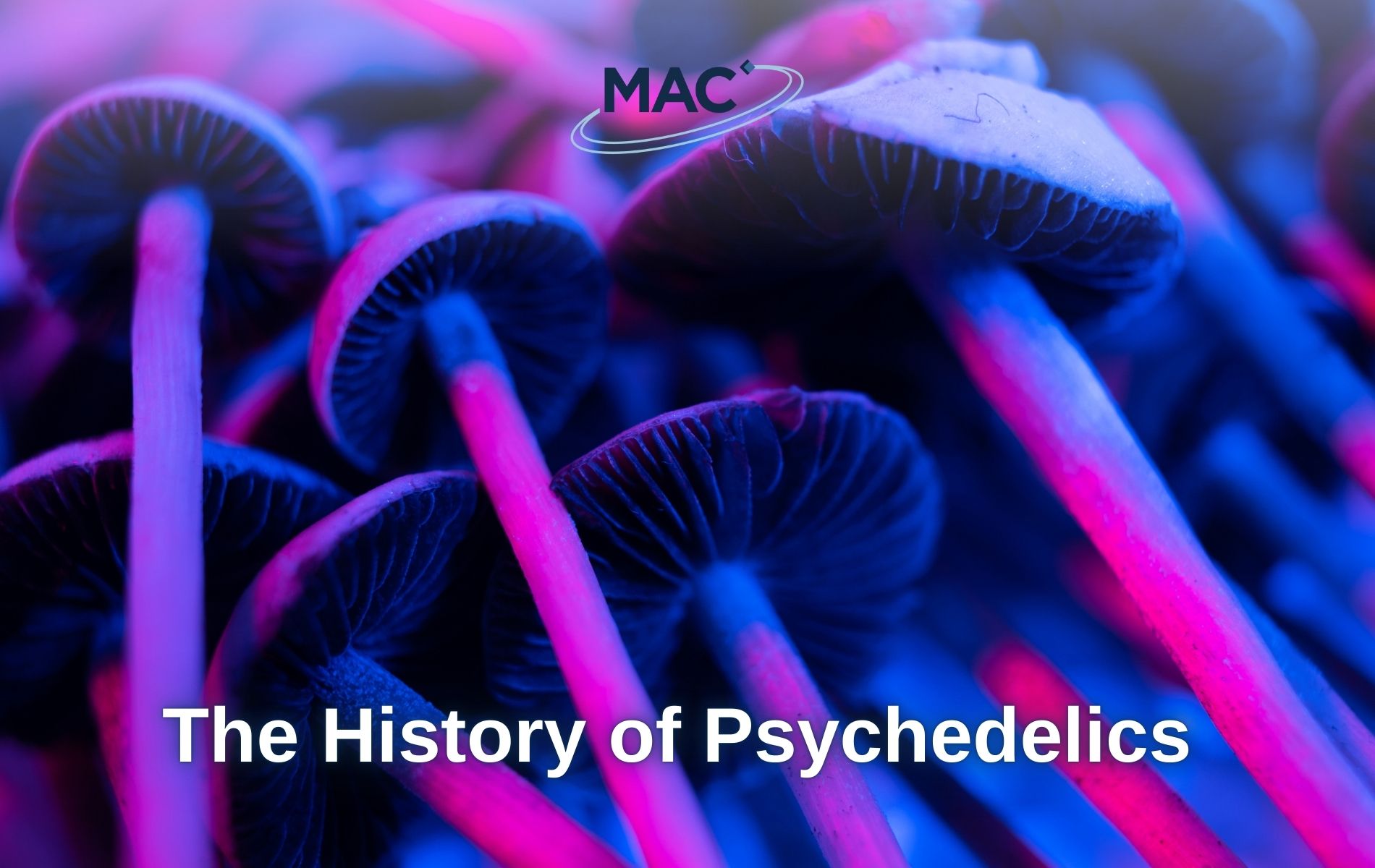Psychedelics are experiencing a renaissance; once stigmatised and criminalised, these substances are now at the forefront of groundbreaking clinical research, offering new hope for the treatment of various mental health conditions. This transformation is not only reshaping the landscape of clinical research but also altering societal perceptions. In this blog, we’ll be exploring the history of psychedelics.
What are Psychedelics?
Psychedelic compounds work by influencing the brain’s serotonin receptors, which regulate a person’s mood. These substances create a state of heightened consciousness, leading to profound shifts in perception and self-awareness.
Sometimes referred to as hallucinogenic drugs, psychedelics can include substances like LSD, psilocybin, DMT, 2C-B, and less commonly MDMA. These are currently categorised as Class A drugs in the UK, meaning if you are in possession of them you could face a up to seven years in prison, an unlimited fine, or both1. However, around 1.1 million people in the UK used Class A drugs in 2022-232. Their use in clinical research requires a license from the Health Research Authority.
1950s – Early Research
The journey of psychedelics in clinical research began in the mid-20th century. Substances like LSD (lysergic acid diethylamide) and psilocybin (the active compound in “magic mushrooms”) were initially explored for their potential therapeutic benefits.
Renowned researchers Humphrey Osmond and Abram Hoffer recruited volunteers in 1951 to take LSD and theorised that the drug was capable of inducing a new level of self-awareness which may have enormous therapeutic potential3.
Early studies suggested these substances had profound effects on consciousness and could potentially be used to treat a range of mental health conditions, including depression, anxiety, and addiction.
1960s – Changing Opinions
Many people would associate psychedelics with the cultural revolution of the 1960s. Research swiftly halted during this decade, primarily due to political reasons. In the US in 1963, LSD become highly accessible in the form of liquid soaked onto sugar cubes, growing its popularity and was adopted by the hippy counter-culture movement by the late 1960s.
It was also during this era that LSD became perceived as a drug of abuse and was banned by the British government in 19664. It was banned in the US two years later after becoming closely associated with the anti-war demonstrations5.
2000s – A Resurgence in Research
The late 20th and early 21st centuries witnessed the rebirth of psychedelic research. Advances in neuroscience and a growing mental health crisis prompted researchers to revisit these compounds.
Scientists have researched into psychedelics for addiction; in a 2014 study conducted by the John Hopkins Centre for Psychedelic and Consciousness Research, participants who were smoking addicts were dosed with psilocybin and reported an 80% success rate in quitting, compared with 35% for those using over-the-counter antismoking medicines6.
Researchers have also conducted trials for psychedelics to treat anxiety and depression. In 2016, one study reported that a substantial majority of people suffering cancer-related anxiety or depression found considerable relief for up to six months from a single dose of psilocybin in a clinical setting7.
2020s – The Future of Research
The future of psychedelic research looks promising. With increasing funding, more sophisticated study designs, and growing public interest, the potential for psychedelics to revolutionise mental health treatment is vast.
MAC Clinical Research are proud to be part of the revolutionary research changing perceptions on psychedelics to treat mental health conditions. So far, we have been involved in seven psychedelic clinical trials, researching psilocybin, ibogaine and DMT. We are also the first UK company to administer ibogaine by IV in a clinical research setting.
As part of these trials, we administer the psychedelics in a safe and relaxed environment in private, specially equipped rooms to minimise the chances of any psychological distress. Our specialist and experienced psychiatrists and therapists are certified to provide psychedelic treatments and monitor our clinical trial participants. To find out more about our current research and how you can get involved, visit our current trials webpage.
1 GOV.UK – Drug Penalties
2 Office for National Statistics – Drug misuse in England and Wales: year ending March 2023
3 The Guardian – A brief history of psychedelic psychiatry
4 BBC News – Did LSD change Britain?
5 University of Oregon – Explaining the Criminalization of Psychedelic Drugs
6 Journal of Psychopharmacology – Pilot Study of the 5-HT2AR Agonist Psilocybin in the Treatment of Tobacco Addiction
7 Journal of Psychopharmacology – Psilocybin produces substantial and sustained decreases in depression and anxiety in patients with life-threatening cancer: A randomized double-blind trial




